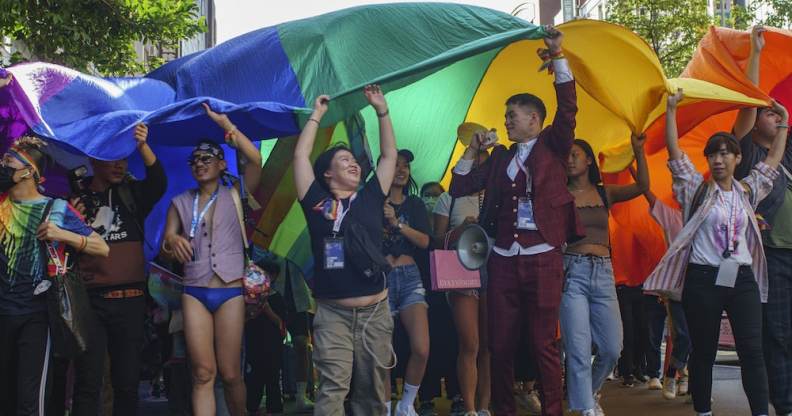Judge tells gay man he can adopt his husband’s child in historic step for Taiwan

Taipei Pride 2020, Taiwan. (LightRocket via Getty/ Alberto Buzzola)
A judge in Taiwan has ruled in favour of a gay man who wants to adopt his husband’s non-biological child, in a historic step for LGBT+ rights.
Currently Taiwan, which in 2019 became the very first country in Asia to legalise marriage equality, only allows same-sex couples to adopt when one partner is the biological parent of the child.
But on 25 December, a family court in Kaohsiung city ruled that 38-year-old Wang Chen-wei’s child, who he previously adopted, could also be adopted by his 34-year-old husband Chen Chun-ju.
However, the ruling only applies to their specific case, and has not legalised same-sex adoption across the country.
Chen-wei told AFP: “I am happy that my spouse is also legally recognised as the father of our child… but I can’t feel all that happy without amending the law.
“It’s really absurd that same-sex people can adopt a child when they are single but they can’t after they get married.”
According to Taipei Times, Chen-wei added on Facebook: “We will continue to fight. The key is having the law revised.
“If our family wants to adopt another child, will we have to go through the same process again and gamble on which judicial affairs officer we get? Or will the law have been amended so it won’t be so hard for everybody?”
The path forward for other same-sex couples who want to adopt is unclear.
The Act for Implementation of Judicial Yuan Interpretation No 748, which legalised same-sex marriage in Taiwan, does not expressly allow or forbid same-sex adoption of children who are not biologically related to either parent, and only mentions one spouse adopting “the genetic child of the other party”.
While the Kaohsiung ruled that it the child in question should not be discriminated against, and that it would be “inappropriate to give a negative or discriminatory interpretation of the provision”, the Taiwan Equality Campaign said that two other couples it supports had had their adoption requests rejected.
Jennifer Lu, executive director of the LGBT+ rights group, told AFP: “We hope the rulings serve as a reminder to government officials and lawmakers that the current unfair legal conditions need to be changed.”

